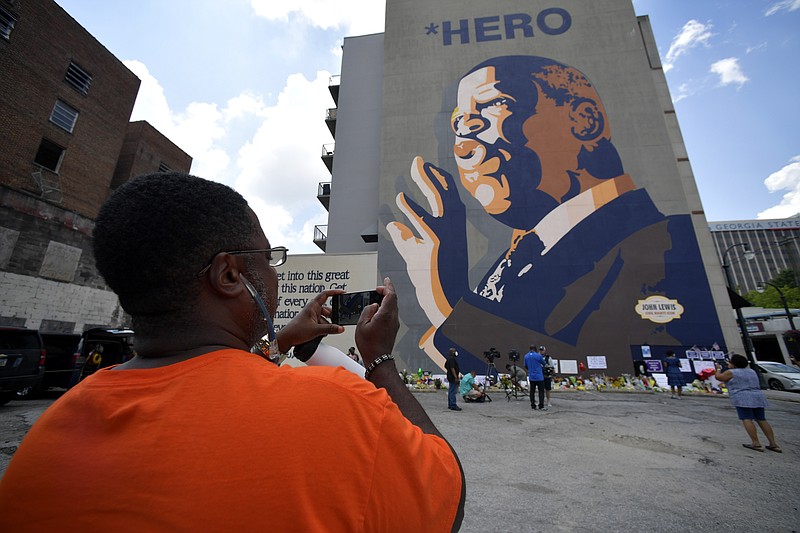In these current polarizing times, where improved race relations should be the goal, the Smithsonian Institution's National Museum of African American History and Culture recently took the ideal two steps backwards.
In online material surrounding the topic "Talking About Race," the museum posted a chart titled "Aspects & Assumptions of Whiteness & White Culture in the United States," suggesting the nuclear family, hard work, Christianity, being on time and politeness are manifestations of whiteness.
Somehow, we don't think this is what the late U.S. Rep. John Lewis and the Rev. C.T. Vivian, two icons of the civil rights struggle who died on the same day last week, had in mind in their fight for equality.
The chart, which was posted just days after Black suspect George Floyd died at the hands of white Minneapolis cops in late May, was recently taken down, and museum officials have apologized for its message.
"[It] does not contribute to the productive discussion we had intended," they said.
In truth, to suggest the nuclear family, hard work, Christianity, being on time and politeness, among many other things, are largely white ideals demeans all Blacks.
Black syndicated columnist Walter Williams, whose commentaries run on this page on Sundays, for instance, has been strident on how the devastating the destruction of the nuclear family has been on Black America.
In 1960, only 22% of Black children were raised in single-parent families, he wrote. Now, he said, the number of children raised in such families is well over 70%. In Black families today where the husband and wife work, he said, the poverty rate is under 5%. In Black families headed by single women, the poverty rate is 37%.
Civil rights leader Dr. Martin Luther King Jr. had some definite thoughts about work.
"If a man is called a street sweeper," he said, "he should sweep streets even as Michelangelo painted, or Beethoven composed music, or Shakespeare wrote poetry. He should sweep streets so well that all the hosts of heaven and Earth will pause to say, 'Here lived a great street sweeper who did his job well.'"
Indeed, a 2020 National Association of Colleges and Employers (NACE) poll found that Black parents are from 1% to 3% more likely than white parents to think the traits of "hard work," "being well-mannered" and "persistence" are important to teach children.
"You cannot give up," said Lewis, the longtime Georgia congressman who was severely beaten 55 years ago during a march across Selma, Alabama's Edmund Pettus Bridge. "You have to be persistent and keep pushing, and press on."
The NACE poll also said four out of five employers expected all job applicants to exhibit a strong work ethic, the ability to work as a team and analytical thinking skills.
Being on time? Well, a 2017 Career Builder survey in the United States found that 41% of all employees are terminated due to continual lateness to work. Being five minutes late, we once heard a theatrical director tell a cast of 30, is really the same as being 150 minutes late because 30 people had to wait five minutes. Do the math.
If this were someone's random blog post, Black and white Americans alike could laugh it off as an alternative David Duke-ian theory that would have few eyes on it before being forgotten.
But this was perpetrated at the country's most prominent museum, someone was paid for its content and it remained in the public domain for more than a month and a half. Worse, like tinder to light a fire, it came during the uprising following Floyd's death when uniformed young people were gulping down theories that white supremacists are around every corner, racism dominates the culture and law enforcement exists only to kill Black people.
Elsewhere, at the same time, the debunked theories of The New York Times' 1619 Project are being peddled to public schools, and mainstream media magnate Oprah Winfrey is partnering with Lionsgate to turn the Slavery-R-Us theory of the country's founding into films and television.
If Oprah's behind it, America's lemmings too often think, why question it?
But we must all question such tactics if we're ever to achieve an America where, as King said, people are judged not "by the color of their skin but by the content of their character." So one senator took up that mantle about the Smithsonian content this week.
"The claim that these qualities and commitments - ideas Americans of all races have traditionally celebrated and strived to teach their children - are distinctive to white Americans would be troubling enough given its implication that they are foreign to Americans of color," Sen. Josh Hawley, R-Missouri, wrote in a letter to the Smithsonian. "However, the position of the Smithsonian, as suggested by the materials prior to their removal, appeared to be more troubling: that these attributes are actually emblems of 'structural racism' in American life to be rejected rather than embraced."
America today is not the country in which John Lewis and C.T. Vivian were beaten in pursuit of civil rights, but it's not perfect either. Yet, ascribing aspects and assumptions about white culture, and demeaning Blacks while doing so, is not the change either had in mind.
"When people tell me nothing has changed," Lewis once said, "I say come walk in my shoes and I will show you change."
